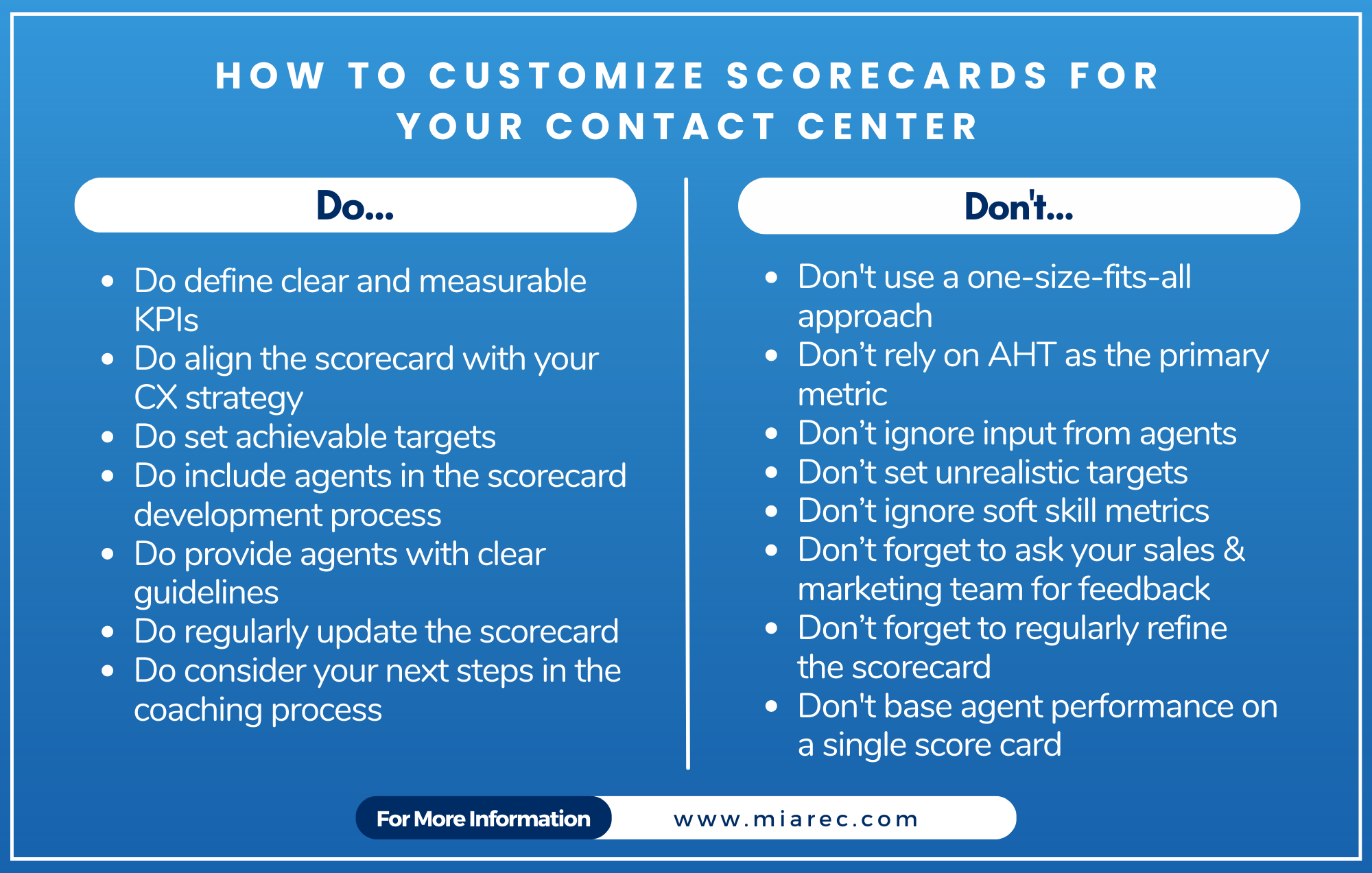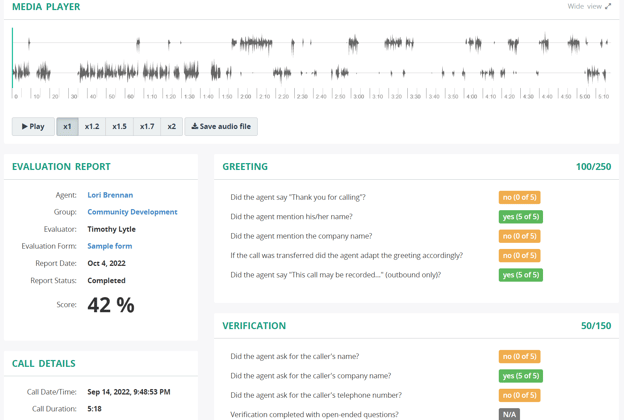Customizing Scorecards For Your Contact Center: The Do’s And Don’ts

When 55% of consumers walk away from a company after experiencing bad customer service, your contact center must always provide quality interactions and support. Using scorecards to grade your agents’ calls can ensure agents are consistently keeping customers happy.
At MiaRec, we provide Automated Call Scoring solutions that help contact center leaders streamline call scoring processes to improve customer experiences. We know how important it is for your scorecards to reflect contact center and customers’ expectations.
This article will share ways you can customize your agent scorecards to gather meaningful insights that will improve customer experiences, agent performances, and business workflows. By the end of this article, you will know how to create an effective scorecard that targets your contact center’s business goals.
What Is An Agent Scorecard?
Agent scorecards, also known as contact center scorecards, call center scorecards, or quality assurance scorecards, are part of an agent’s evaluation process. These scorecards establish the metrics your agent calls are graded on and should reflect customer expectations.

Image: A partial evaluation form on MiaRec’s platform. It includes example questions on how an agent should begin customer calls.
Why Contact Centers Need Scorecards
Your scorecard results can indicate customer satisfaction levels, how well agents adhere to call scripts, and ways to improve agent performances, leading to faster responses and shorter average handle times. You can share scorecard results with agents, which helps them understand why they received specific scores and which metrics they need to improve on. Scorecards are an objective way to grade agent interactions, leading to better customer experiences and more nuanced agent training advice.
The Do’s and Don’ts To Building A Scorecard
So how can you build a scorecard that accurately reflects your contact center’s goals and customer expectations? When creating a scorecard, you must consider what your ideal agent should know and what your perfect customer interaction looks like. We have provided a few suggested best practices to keep in mind when creating a scorecard.
Do’s:
- Do define clear and measurable key performance indicators (KPIs) that align with the contact center’s goals and objectives. These KPIs should include a balanced mix of quantitative and qualitative customer-centric metrics, such as customer satisfaction and first-call resolution rates.
- Do align scorecards with your organization’s overall customer experience strategy and values. We recommend implementing a weighted scoring system that prioritizes the most critical metrics for your contact center’s success.
- Do set achievable and realistic targets for each metric. Consider factors such as your contact center’s average call volumes. For instance, it can be difficult for agents to provide thorough post-call notes when they are battling high call volumes.
- Do include contact center agents in the scorecard development process. They often have valuable input.
- Do include metrics that measure agent adherence to company policies, guidelines, and quality standards.
- Do provide agents with clear guidelines and expectations for each metric and actionable tips for improvement.
- Do regularly review and update scorecards to adapt to changing business needs and industry trends.
- Do define your scorecard's next steps. Consider what your scorecard will be used for. You can use scorecards to personalize agent training, gather customer insights to drive marketing campaigns, and more.
Don’ts:
- Don't use a one-size-fits-all approach. Avoid using the same scorecard for everyone without considering your agents and/or department’s specific needs and objectives.
- Don’t solely rely on average handle time (AHT) as the primary metric; it can encourage rushed interactions and negatively impact customer satisfaction.
- Don’t solely rely on automated data or ignore input from agents or other stakeholders. It's important to consider multiple perspectives.
- Don’t set unrealistic targets. Rigid and difficult-to-understand scorecards demotivate agents. Scorecards should be flexible to adapt to specific customer needs or unique situations that may arise.
- Don’t ignore the qualitative aspects of agent performance; consider metrics like customer feedback, quality evaluations, and soft skills.
- Don’t solely focus on your contact center’s needs. Other departments, such as your sales and marketing team, may have meaningful questions or criteria they would like to include onto the scorecard.
- Don’t forget to regularly review and refine the scorecard based on feedback from agents, managers, and changes in business requirements.
- Don't base agent performance on a single scorecard. Be sure to look at performance trends over time.
How To Weigh Questions To Reflect Your Contact Center’s Priorities
The more important it is for an agent to get a specific question right, the more points that question should be worth. Your scorecard questions are not all equally important. For instance, while agents should introduce themselves, it is vital that they are always following state and federal privacy laws. We recommend weighing questions according to your contact center's priorities.
When determining how much a question should impact your scoring criteria, consider which metrics are essential in achieving your organizational and customer service goals. Compliance and data security questions should typically weigh more because they are essential to maintaining customer trust and avoiding legal consequences.
Assigning the appropriate value to questions ensures that your scorecard aligns with your contact center's values. Scorecards should guide agents toward actions that contribute most effectively to overall success and customer satisfaction.
What Makes A “Good” Scorecard?
A “good” or effective scorecard should set accurate and achievable expectations for your agents. Our suggested best practices can help you ensure your scorecard considers agent feedback, relative metrics, and aligns with your company’s values.
Scorecards should encourage agents to communicate effectively, maintain a professional demeanor, and build customer trust. Your scorecard questions should be objective and well-defined so that contact center agents can easily understand your expectations.
Here are examples of good scorecard questions:
- Did the agent ask how the customer was doing?
- Did the agent verify the customer’s contact info?
- Did the agent gather the customer’s member ID?
Customizing Scorecards For Your Contact Center's Industry Needs
Contact centers should tailor scorecards to reflect industry regulations and company policies. For instance, contact centers in highly regulated industries generally will prioritize complying with privacy regulations, while their sales departments may want them to focus on gathering customer insights. This section will provide suggestions on how to customize scorecards according to different industry and department requirements.
When customizing agent scorecards for your healthcare-based contact center, you have to ensure agents are up-to-date on HIPAA regulations, along with additional federal and state privacy and patient rights laws. Agents must also ensure they are up-to-date on insurance policies and payment plans, such as the different types of co-pays, deductibles, eligibility concerns, coverage inquiries, enrollment periods, and more.
Healthcare agents must also prioritize bedside manners as they often work with patients or caretakers under challenging situations. Scorecards are an excellent reminder for agents to remain professional, even under stressful conditions. The right scorecard can help agents lead conversations, follow compliance reminders, and discover ways to improve performance.
Similar to contact centers in the healthcare industry, your Financial Services Industry (FSI) contact center’s scorecards have to ensure agents follow compliance regulations and company policies. Agents in the FSI have to keep up with compliance guidelines (such as the PCI-DSS, Frank-Dodd Act, and more) and your financial institution’s policies (loan qualifications, borrowing rates, etc.), all while juggling rising call volumes.
To manage increasing call volumes, your scorecard metrics should aim to streamline interactions for agents. Your agent’s call scripts need to be efficient and compliant, yet personalized and friendly. To improve script efficiency, your scorecard could have a section that measures call script adherence,
For contact centers in retail, lousy customer experiences could make or break your customer’s loyalty to your organization. Scorecards for retail contact centers should prioritize friendliness and personality, and encourage agents to build rapport with customers. Your scorecard can also help agents stay on top of return policies, current sales, marketing campaigns and more. Retail organizations are also subject to PCI-DSS and other payment regulations, your scorecards will also need to include some compliance metrics.
Contact centers for insurance agencies will have to keep track of multiple types of insurance, such as life and health, or car and home insurance. Agents have multiple policies and packages they need to keep in mind. Most insurance companies have specific steps on how to handle interactions, such as how to handle a claim, purchase insurance, cancel insurance, and more. For legal reasons, contact center agents in insurance must be cautious of how they word or present insurance policies. Insurance contact centers’ scorecards should help agents keep track of your organization's various policies and processes. You could include questions such as, “Was the agent well-informed about various insurance products and coverage options?” or “Could the agent explain complex insurance terms and concepts in a clear and understandable manner?”.
Creating Scorecards For Your Organization’s Sales & Marketing Departments
Beyond industry-specific policy and compliance regulations, other departments could be interested in utilizing scorecards to gather customer insights. Sales and marketing teams may want to know how agents are answering customer questions and how they are promoting products and services.
Contact centers can keep their marketing and sales teams in mind when developing scorecard criteria by creating a scorecard for outbound calls that includes questions such as, “Did the agent let their customer know they were on a recorded line?” or “Did the agent confirm that the prospect meets the basic criteria for the product/service being offered?” These insights help sales and marketing teams understand their customer base, develop products and services, and adjust products and services according to customer preferences.
For example, let us pretend a retail organization has launched a promotional sale. The organization’s sales and marketing team may ask contact centers to notify customers about this promotion while it is still active. Your scorecard could include a question such as, “Did the agent notify customers of our ongoing sales promotion?”
Conclusion
Agent scorecards are crucial to improving agent performances and customer experiences. Customizing your agent scorecards to reflect realistic operational goals and success metrics will improve your contact center’s customer experiences.
Start customizing scorecards now to increase customer satisfaction and reduce churn. MiaRec can help you design scorecards based on your specific industry requirements and business goals. Contact our sales team to learn more.
Share this
You May Also Like
These Related Stories

What Microsoft’s Digital Contact Center Means for Call Recording & CX

Benefits of Call Recording for Debt Collectors



